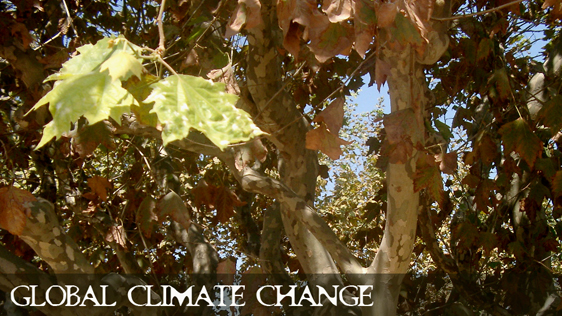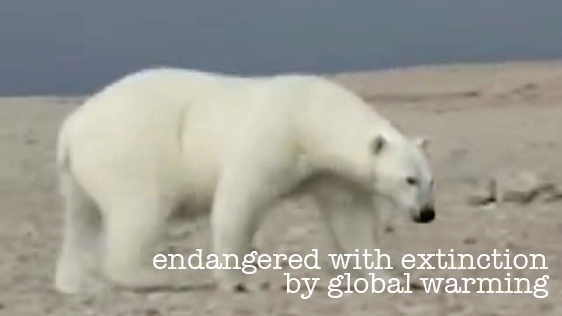
Due to the science we already have, the laws we have to govern our own activity and to force government to act for the public health, we face the real possibility of being forced, in American courts, in the future, to pay for damage done to the most affected populations in other parts of the world, as a result of inaction by our government. And if not in court, then as a matter of the de facto urgencies of international political stability.
If we do not find a way to work to mitigate global climate change, future generations will look back and will see clearly that a zeitgeist of selfish convenience and primitive disregard for the wellbeing of our fellow human beings led to a reckless attitude with regard to this snowballing crisis. The public voice, and those campaigning for the level of public respect needed for election to office, should bring this issue to the fore, push for real initiatives to tackle the problem boldly, in a collaborative way, now.
In November, UN secretary general Ban Ki-moon wrote a piece entitled "
At the tipping point", in which he explained some of the most dire aspects of the advancing effects of global climate change. Among the serious potential crises is the evidence that 20% of of Antarctica's territory, in the form of the West Antarctic Ice Sheet, may break up. "If it broke up, sea levels could rise by six meters", he writes.
Added to that, such massive events may take some time to unfold, but once they reach their respective tipping point, the event itself could happen "quickly, almost overnight". It's worth considering what effect such a sudden sea-level rise would have on low-lying coastal cities, like New York, Mumbai or Shanghai, Dubai, Sydney or Hong Kong. The storm surge that breached New Orleans' levees and plunged the city into chaos was roughly six meters.
The IPCC is one of the most comprehensive and prestigious bodies of scientists ever gathered from around the world, and it has been unequivocal in its reports this year. Every major player in world politics, including Pres. Bush, has acknowledged that global climate change is happening, and is the result of human activities. 2007 will be remembered as the year the climate crisis went public and stayed on the global public interest radar, for good. The United States cannot afford to be lagging behind, not now, and not in the eyes of history.
Senator Barack Obama's campaign website explains the problem as follows: "Global warming is real, is happening now and is the result of human activities. The number of Category 4 and 5 hurricanes has almost doubled in the last 30 years. Glaciers are melting faster; the polar ice caps are shrinking; trees are blooming earlier; oceans are becoming more acidic, threatening marine life; people are dying in heat waves; species are migrating, and eventually many will become extinct." In fact,
large-scale mass extinction already appears to be underway, with the IPCC predicting
15% to 37% of all species may be wiped out by climate change alone.
The campaign issue write-up continues: "Scientists predict that absent major emission reductions, climate change will worsen famine and drought in some of the poorest places in the world and wreak havoc across the globe. In the U.S., sea-level rise threatens to cause massive economic and ecological damage to our populated coastal areas." Many may disagree, but the science supports every word of the problem as stated. US presidential candidates are, for the first time, seriously contending for the climate-responsibility prize.
So, for those candidates serious enough to work across ideological rifts, a proposal for responsible legislation to deal with this crisis (to be pushed for and initiated in advance of the November 2008 US elections):
1.
Push a 90% emissions reduction goal for 2050, and make it global. (There's no reason this cannot be done.
Wind-energy resources in Texas, Kansas and North Dakota alone could power the entire US economy and more, if properly funded and developed. Most nations have a surplus of wind resources; the secret is local development and responsible construction and implementation. Other new technologies and a rebuilding of transport infrastructure can help reach this goal, without undermining economic stability.)
2.
Work to punish all forms of corruption associated with energy production, and implement stiff sanctions against any nation that does not severely punish such corruption (whether it's bribery is Appalachian coal mining schemes, Saudi authoritarianism and arms trafficking, Uzbekistan's megalomaniac leader, or China's support for the Bashir government in Khartoum).
3.
Ensure that the US economy is incentivized, from top to bottom, to adopt renewable resources and that we can fund through innovation, entrepreneurship, research and development grants, the green technology boom, which if properly carried out, will far surpass the 1990s economic expansion related to the building and popularization of the world wide web.
4.
Institute in US law a "limited use" doctrine for nuclear plants, which means they will be employed in a period of transition (with no new construction) as a means of softening the price pinch that could come to sectors that lag in the renewables transition. This is not meant to allow new growth or prolonged use of fossil fuels, but rather to avoid punishing the underprivileged for their lack of access to easy capital. Eventually, a plan will need to be implemented that will transition away from these extremely costly plants with unequaled capacity for contamination (in case of accident).
5.
Greening the military: begin immediately the funding and incentivization for defense contractors of a comprehensive transition to a military made more efficient, flexible and green in its global reach by way of the ecological (which in the very near future means economic) sustainability of its technologies and deployment systems. This will soon be a measure of rapid-deployment capacity, i.e. the ability to project power without bankrupting the state, so there is a direct security motivation involved in this. (The US military is a massive source of research and development, and cutting-edge technologies could emerge for civilian use, if the fossil fuel addiction is broken.)
6.
Plan for "jump" generation innovations: energy resourcing is still in its infancy, comparatively (fossil fuels are square one; nuclear a bold but ill-advised 'spur'; renewables are the first step toward rational sustainable energy policy; after renewables, or within the context of, there will come a more advanced mode of powering the global economy). Geothermal still relies on risky construction methods, wind requires massive construction and solar occupies space (ever less, but still a constraint), whereas new capabilities may be lying in wait beyond the scope of current scientific methods.
Let's think ahead and privilege the "zero emissions" criterion. The more we can do to implement large-scale energy solutions that are in themselves zero-emissions processes, the larger the percentage of current emissions we can do without. It's that simple.
We are on the cusp of an energy revolution, which is synonymous with acting to save the relative homeostasis of the global environment, to which our civilization is accustomed and which it requires for long-term stability. We can phase out fossil fuels, then nuclear, while building a global renewables grid, and (parallel to that) jumping ahead to what's next. Integrated thinking will help us to serve the needs of a global systems ecology imperiled by our current practices.
Lastly, I propose that it is of the utmost urgency to examine security risks involved with climate change. We already have water wars in Africa. There are potential hydrological conflicts brewing in South America and south Asia. Australia faces the possibility of the Sydney region becoming near uninhabitable in a century's time. And Bangladesh, with more than 150 million inhabitants, is caught between India's overpumping of vital rivers and the constant threat of mass death and chaos from monsoon flooding.
We need to look at the potential for crop failure on massive regional scales, resulting economic or political collapse, or the unplanned migration of tens of millions of refugees, and what happens when local militia start responding (reference: Darfur, or Afghanistan, on a much larger scale).
We need to find a collaborative framework wherein:
1.
democracy is not in any way curtailed nor are totalitarian measures elevated by the global protocols;
2.
global treaties are bold, viable, respected and implemented;
3.
the median wealth of the human population globally is increased (to de-incentivize violations).
This is the
very least we can do to get started.





















